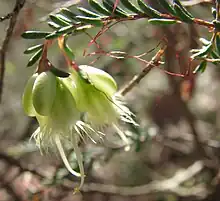| Fairy bells | |
|---|---|
 | |
| Homoranthus darwinioides in Maranoa Gardens | |
| Scientific classification | |
| Kingdom: | Plantae |
| Clade: | Tracheophytes |
| Clade: | Angiosperms |
| Clade: | Eudicots |
| Clade: | Rosids |
| Order: | Myrtales |
| Family: | Myrtaceae |
| Genus: | Homoranthus |
| Species: | H. darwinioides |
| Binomial name | |
| Homoranthus darwinioides | |
 | |
| Occurrence data from AVH | |
| Synonyms | |
| |
Homoranthus darwinioides, commonly known as fairy bells,[2] is a species of flowering plant in the family, Myrtaceae. It is a small, spreading shrub with pendulous yellow and pink flowers, grey-green leaves and is endemic to New South Wales.
Description
Homoranthus darwinioides is a small, spreading shrub 1–1.5 m (3–5 ft) high, 60 cm (24 in) wide, smooth stems with a stiff upright habit. The greenish-grey leaves are arranged in opposite pairs, fleshy, needle-shaped, 3–4 mm (0.12–0.16 in) long, 1 mm (0.039 in) wide. The pendulous, conspicuous yellow and pink flowers are borne in pairs in upper leaf axils on a pedicel 1 mm (0.039 in) long. The small bracts are leaf-like, persistent during and after the flowering period, calyx tube about 1 cm (0.39 in) long with 5-7 fringed awns of equal length. The prominent style protrudes 7–8 mm (0.28–0.31 in) above the petals. Flowering occurs primarily in spring and summer, although may sporadically throughout the year.[3][4][5]
Taxonomy and naming
Homoranthus darwinioides was first formally described in 1898 by Joseph Maiden and Daniel Ludwig Ernst Betche and given the name Verticordia darwinioides and the description was published in Proceedings of the Linnean Society of New South Wales.[6][7] It was transferred to the genus Homoranthus in 1922 by botanist Edwin Cheel and published in Journal and Proceedings of the Royal Society of New South Wales.[8][9] The specific epithet (darwinioides) refers to the similarity to the genus Darwinia.[10]
Distribution and habitat
Fairy bells grows in shrubby woodland in deep sandy soils over sandstone. It has a scattered distribution on the western slopes and central tablelands from just north of Dubbo to west of Denman.[11]
Conservation status
Homoranthus darwinioides is a priority species under the Threatened Species Strategy and a 'keep watch' species under the NSW Government Saving our Species program. An uncommon species considered vulnerable by Briggs and Leigh(1996) and given a ROTAP conservation code of 3VCa.[4]
References
- ↑ "Homoranthus darwinioides". Australian Plant Census.
- ↑ "Homoranthus darwinoides". NSW Government Threatened Species. NSW Department of Planning, Industry and Environment. Retrieved 27 October 2020.
- ↑ G.J. Harden. "New South Wales Flora Online: Homoranthus darwinioides". Royal Botanic Gardens & Domain Trust, Sydney, Australia.
- 1 2 Copeland, Lachlan M.; Craven, Lyn A.; Bruhl, Jeremy J. (2011). "A taxonomic review of Homoranthus (Myrtaceae: Chamelaucieae)". Australian Systematic Botany. 24 (6): 351. doi:10.1071/SB11015.
- ↑ Blake, Trevor L. (1981). A Guide to Darwinia and Homoranthus. Maroondah, Victoria: Society for Growing Australian Plants. p. 71. ISBN 0909830150.
- ↑ Maiden, Joseph; Betche, Daniel (1898). "Verticordia darwinioides". Proceedings of the Linnean Society of New South Wales. 23 (1): 17. Retrieved 13 May 2021.
- ↑ "Verticordia darwinioides". Australian Plant Name Index. Retrieved 13 May 2021.
- ↑ Cheel, Edwin (1922). "Homoranthus darwinioides". Journal and Proceedings of the Royal Society of New South Wales (56): 77. Retrieved 13 May 2021.
- ↑ "Homoranthus darwinioides". Australian Plant Name Index. Retrieved 13 May 2021.
- ↑ Sharr, Francis Aubi; George, Alex (2019). Western Australian Plant Names and Their Meanings (3rd ed.). Kardinya, WA: Four Gables Press. p. 178. ISBN 9780958034180.
- ↑ "Homoranthus darwinioides". Species Profile and Threats Database. Australian Government-Department of Agriculture, Water and Environment. Retrieved 13 May 2021.